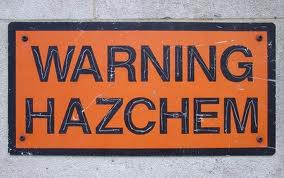EPCRA Emergency Planning Requirements
In my previous post I mentioned the Emergency  Planning and Community Right to Know Act (EPCRA) is composed of three major parts. In today’s post I will focus on Emergency Planning, the portion of the law which intends to prepare state and local governments to respond to the most likely hazardous chemical emergencies. EPCRA requires the existence of two organizations at the state and local government levels:
Planning and Community Right to Know Act (EPCRA) is composed of three major parts. In today’s post I will focus on Emergency Planning, the portion of the law which intends to prepare state and local governments to respond to the most likely hazardous chemical emergencies. EPCRA requires the existence of two organizations at the state and local government levels:
1. The State Emergency Response (SERC) Commission and
2. the Local Emergency Planning Committees (LEPC).
Facilities with onsite quantities of Extremely Hazardous Substances (EHS) at or above the Threshold Planning Quantities (TPQs) must notify both the SERC and LEPC within 60 days of equaling or exceeding the thresholds (either by production or purchase). The SERC typically has the required notification forms which can be obtained by visiting the SERC website for the state in which you reside. Click here to see to Florida form for notification. Some of the most common EHS in my experience are:
Hydrogen Fluoride TPQ=100 lbs
Formaldehyde TPQ=500 lbs
Sulfuric Acid TPQ=1000 lbs
If your company has any of the above materials or any EHSs listed on Appendices A and B at or above the TPQ a notification to the LEPC (websites to LEPCs can be found through each SERC) and the SERC is required. A fee will most likely need to accompany your notification form, Florida’s fee is $50. Keep in mind that some states have other requirements related to Emergency Planning, please visit your state’s SERC website for further details.
Facilities with EHS at or above TPQs are also required to identify an emergency coordinator who will represent the facility and also participate on the LEPC in preparation and creation of emergency response plans.
Would you like additional details about the emergency planning and notification portion of EPCRA? If so see the following guidance documents:
EPCRA FAQs on Sections 301 and 302
Emergency Planning Requirements
My next post will tackle Emergency Release Notifications required by Section 304. Have questions you would like answered? Leave a comment below.

3 Replies to “EPCRA Emergency Planning Requirements”
Comments are closed.